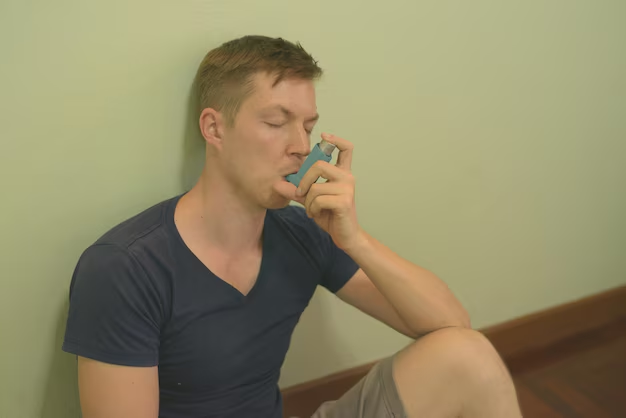Understanding Asthma Symptoms: What You Need to Know 🌬️
Asthma, a chronic respiratory condition, affects millions of people worldwide. Its impact can range from mild discomfort to life-threatening incidents, making awareness and understanding of its symptoms crucial. Whether you're managing asthma yourself, or you know someone who is, recognizing the signs can lead to better management and quality of life.
Common Symptoms of Asthma 🌡️
Asthma symptoms can vary in frequency and severity from person to person. It's essential to recognize these symptoms early on to prevent them from worsening. Here are the most common symptoms associated with asthma:
1. Wheezing
Wheezing is a high-pitched whistling sound made while breathing, often most noticeable when exhaling. It is a direct result of narrowed airways due to inflammation or mucus buildup. While wheezing is a common indicator of asthma, it can also signal other respiratory issues.
2. Shortness of Breath
Experiencing shortness of breath, especially during physical activity, is another telltale sign. This sensation can occur because the airways become constricted and filled with mucus, making it difficult for air to pass through.
3. Coughing
Asthma-related coughing is typically dry and persistent, often worsening at night or early in the morning. The cough can be triggered by irritants such as smoke or strong odors, or during physical exertion.
4. Chest Tightness
Many individuals with asthma report a feeling of pressure or constriction in the chest. This symptom results from the tightening of muscles surrounding the airways and can be quite uncomfortable or even painful during an asthma attack.
5. Fatigue
Due to insufficient oxygenation from restricted airflow, people with asthma might experience unusual fatigue. This can become particularly noticeable during exercise or after an asthma attack.
Lesser-Known Symptoms 🌿
Asthma is a complex condition, and while the classic symptoms are well-documented, some lesser-known symptoms can signal the presence of the disease as well:
1. Frequent Respiratory Infections
Repeated or prolonged respiratory infections may be indicative of poorly managed asthma. The inflammation in the lungs can predispose individuals to infections like bronchitis.
2. Rapid Breathing
Also called tachypnea, rapid breathing can occur during an asthma flare-up when the body tries to compensate for reduced oxygen levels.
3. Difficulty Sleeping
Asthma symptoms often worsen at night, leading to discomfort, coughing, and an inability to maintain restful sleep, known as nocturnal asthma.
What Triggers Asthma Symptoms? 🚨
Understanding what triggers asthma symptoms can help manage the condition effectively. Here are some common triggers:
- Allergens: Pollen, dust mites, pet dander, and mold are common allergens that can exacerbate asthma symptoms.
- Irritants: Exposure to smoke, strong perfumes, and air pollution can irritate the airways.
- Exercise: Physical exertion, particularly in cold or dry air, can trigger symptoms.
- Weather: Changes in weather, especially cold air, can provoke asthma symptoms.
- Stress: Emotional factors like stress and anxiety can worsen asthma.
Diagnosing Asthma: What to Expect 🩺
Though this article is not meant to provide a diagnosis, it's helpful to understand what typically occurs during an asthma evaluation. Health professionals will assess your medical history, perform breathing tests, and possibly recommend allergy testing to identify potential triggers.
1. Medical History
A thorough medical history helps identify patterns in symptoms and possible triggers. Expect questions about your symptoms' frequency, severity, and triggers, as well as any family history of asthma or allergies.
2. Physical Exam
A healthcare provider will perform a physical exam to check your breathing and listen for wheezing or other abnormal sounds.
3. Spirometry Test
Spirometry is a common test used to measure lung function. It involves blowing into a device that assesses the volume and speed of air you can exhale. This test helps confirm the diagnosis of asthma and determine its severity.
Managing Asthma: Practical Tips and Strategies 🛡️
Lifestyle adjustments and awareness of your environment can significantly help in the management of asthma. Here are some practical tips:
1. Monitor Your Symptoms
Keeping a symptom diary can help identify patterns or triggers over time. Note what you're doing at the time, the environment, and your diet, as this will assist in understanding and managing asthma.
2. Avoid Triggers
An essential part of asthma management is minimizing exposure to known triggers. If you know pollen aggravates your symptoms, consider staying indoors on high pollen days or installing air purifiers at home.
3. Plan for Exercise
Physical activity is beneficial but can trigger symptoms. Consider using preventive medications as prescribed and choosing activities that allow for breaks and variations in intensity.
4. Create an Action Plan
Work with a healthcare professional to create a personalized asthma action plan. This might include recognizing early signs of an attack, using medication correctly, and taking appropriate actions if symptoms worsen.
5. Regular Medical Checkups
Regular appointments with your healthcare provider can help monitor the status of your asthma and adjust treatments as necessary.
Concluding Thoughts on Asthma Awareness ✨
Recognizing and understanding asthma symptoms can be a life-changing advancement for those affected by this often-concealed condition. With vigilance, education, and careful management, living with asthma becomes more manageable, allowing individuals to lead full and active lives.
Summary Table: Asthma Awareness Takeaways 📋
| Key Point | Emoji | Quick Tip |
|---|---|---|
| Common Symptoms | 🌡️ | Wheezing, shortness of breath, cough, chest tightness. |
| Lesser-Known Symptoms | 🌿 | Respiratory infections, rapid breathing, sleep issues. |
| Triggers | 🚨 | Allergens, smoke, exercise, weather changes, stress. |
| Diagnosis | 🩺 | Medical history review, spirometry test. |
| Management Strategies | 🛡️ | Monitor symptoms, avoid triggers, regular checkups. |
These highlights can guide you towards better understanding and managing asthma, ensuring a healthier and more informed life.

